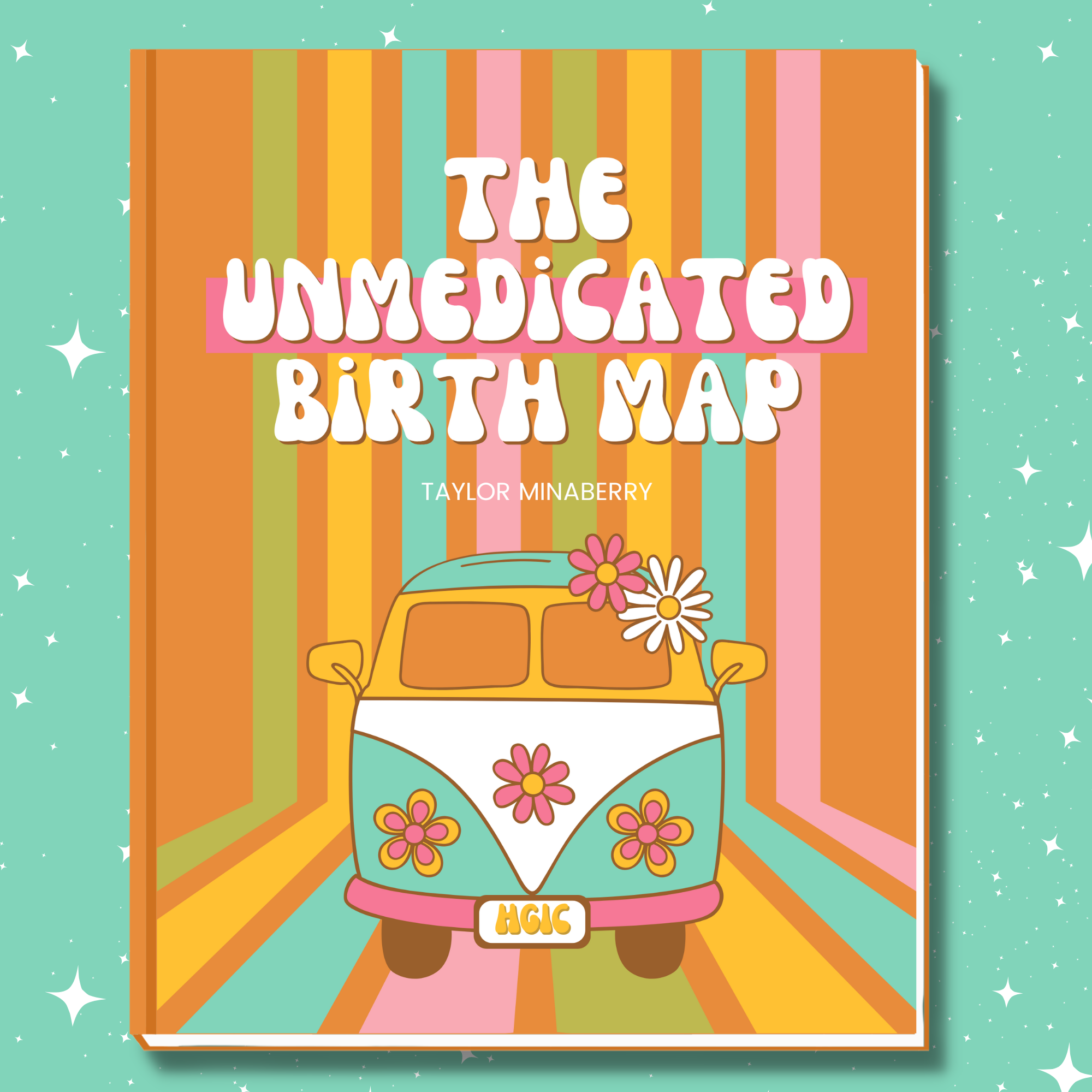Why a Hospital Birth Takes More Than Just a Birth Plan
Feb 18, 2025
Let’s talk about one of the biggest misconceptions I see in the birth world: thinking that a birth plan is enough.
Everywhere I look—especially on TikTok and Instagram—there’s an obsession with creating the perfect birth plan. What to include. What template to use. What font looks the cutest (which, yes, absolutely matters). But while the birth plan matters, there’s one big truth you need to know:
If you make a birth plan and never actually prepare for that plan… you wasted your time.
I know that’s a hard truth. But I’m here to tell it like it is, because your birth experience depends on this.
A Plan Is Not a Strategy
I like to explain this with a little analogy:
Imagine two women sign up for a marathon. They’re both excited. They both print out the same training plan and hang it on their fridge. But one woman never actually trains. The other? She learns everything she can about distance running. She stretches, eats right, practices her pace, and follows the plan.
Race day comes, and they both show up at the starting line with identical plans. Who’s more likely to succeed?
Right. The one who trained.
Birth is the exact same. A plan doesn’t mean much if you haven’t prepared to carry it out.
A Birth Plan Without Preparation Is Just a Wish
Let’s keep it real:
-
What happens when your provider suggests something unexpected?
-
What happens when a nurse questions your birth preferences?
-
What happens when a big contraction hits, and the epidural you swore you’d avoid suddenly sounds real good?
If all you’ve got is a cute piece of paper that says “Unmedicated Birth,” you’re going to freeze. You’re going to doubt yourself. The fear-tension-pain cycle will kick in, and it’s easy to find yourself giving into pressure or pain you weren’t prepared to handle.
But when you have a strategy—when you’ve trained for this moment—you’ll know exactly what to do. You’ll be able to:
-
Recognize when your provider is pushing an intervention that doesn’t align with your plan
-
Speak up confidently when someone questions your choices
-
Manage contractions like a boss because you practiced
And that’s the difference between hoping for an unmedicated birth and actually having one.
The 3 Keys to Pulling Off Your Unmedicated Hospital Birth
So if a plan alone isn’t enough… what is?
I’ve worked with hundreds of women who’ve had successful, empowering, unmedicated births in the hospital, and it comes down to three things:
1. The Right Mindset
Your brain wants to protect you. That means it prefers comfort, familiarity, and “safe” routines. And guess what? Birth is none of those things.
If you don’t train your mind to handle labor, fear will take over.
Fear creates tension. Tension creates pain. That pain confirms the fear. And around and around it goes—until you find yourself accepting interventions you never planned for.
Your mindset isn’t just about a few affirmations. It’s made up of everything you're doing during pregnancy:
-
The information you’re learning
-
The content you’re consuming
-
The conversations you’re having with your provider, your partner, your mom, etc
-
Your past birth experiences and the beliefs they left behind
That’s why I believe all of birth prep is mindset prep. And if you’re not being intentional about shaping that mindset, it’s probably being shaped for you.
In my course, I have a whole lesson called Mindset Magic, where I walk you through exactly how to do this work. But truly, the entire course is designed to strengthen your mind for the big day.
2. Labor Management Skills
Let’s be clear: birth isn’t something that happens to you—it’s something you do.
And it doesn’t have to suck.
Can I tell you a secret?
I literally cannot wait to give birth again. Not just for the baby—for the birth.
Once I understood how birth was designed to work, I had the most amazing, peaceful, empowering experience of my life. I rode that birth high for days. And while I know not every mom will walk away saying “I want to do that again tomorrow,” it’s completely possible to enjoy birth.
You just have to know what you’re doing.
That means:
-
Understanding the role of hormones like oxytocin and endorphins
-
Learning natural pain management techniques that actually work
-
Practicing positions and movements that make labor smoother and more productive
-
Knowing how to keep labor progressing without intervention
And no, unfortunately, you can’t count on your provider to walk you through this. Most OBs don’t even understand how physiological birth works—they weren’t taught it. Natural birth doesn’t make hospitals money. Interventions do.
So no, you’re not being dramatic or paranoid. You’re entering a system that was not built for unmedicated birth. But the good news is—you can learn how to work with your body anyway!
3. Advocacy Tools
If you’re planning an unmedicated birth in the hospital, you’ve got to learn how to advocate for yourself.
The hospital system is a hustle. And you, my friend, need to know how to hustle back.
That means:
-
Holding firm when policies don’t align with your values
-
Navigating pushback from providers or nurses
-
Having the language and confidence to stand your ground
-
Knowing your rights—and how to exercise them respectfully, clearly, and effectively
Inside The Birth Prep Course, I teach this as the Hospital Hustle—because, let’s be real, you’re going to have to outsmart a system that wasn’t designed with your birth goals in mind.
But once you learn the game, you can absolutely win it.
The Plan Matters—But the Preparation Is What Changes Everything
Make your perfect-for-you birth plan.
Get excited about it. Print it in a cute (but clear) font.
But back it with action.
Back it with education.
Back it with mindset work.
Back it with pain management tools.
Back it with advocacy practice.
Your birth depends on it.
Not Sure Where to Begin?
If you’re reading this and thinking, “Okay Taylor, I hear you—but I don’t even know where to start,” girl, I’ve got you.
That’s exactly why I created The Birth Prep Course. It’s practical. It’s strategic. And it’s not a fluffy, surface-level hospital class that teaches you how to be a good little patient.
The course is broken down into:
-
The Groundwork – birth basics, birth physiology, your rights, your team, and how to get started
-
The Nitty Gritty – interventions, hospital policies, mindset, pain management techniques, and advocacy
-
The Big Day – what to expect, how to handle surprises, and how to pull off your dream birth with confidence
There are also bonus trainings like:
-
The Mary Method (for my Jesus girlies who want to birth with faith + surrender)
-
The Newborn Crash Course (decisions to make at the hospital and what to expect after birth)
-
Postpartum Prep (what to expect, how to prep in advance, and how to actually rest and heal)
-
Birthing After Trauma (a must-watch if you’ve had a previous traumatic experience)
And you won’t be doing this alone. Every week, I go live with my students to answer questions, give pep talks, and walk you through the real work.
You’re Not Just Hoping for an Unmedicated Birth—You’re Preparing for One
That’s what separates the wishful from the unstoppable.
So yes, make the plan. But then show up for the work. Educate yourself. Prepare your mind. Practice your skills. Learn the system. And know, deep in your bones, that you are the expert of your birth experience.
Because you are.
And I’m cheering you on every step of the way.
XO - Taylor
Want help getting started?
👉 Grab my free Unmedicated Birth Map to start building your strategy.
👉 Join The Birth Prep Lounge Facebook Group for support and weekly livestreams.
👉 Explore The Birth Prep Course to take this prep to the next level.




